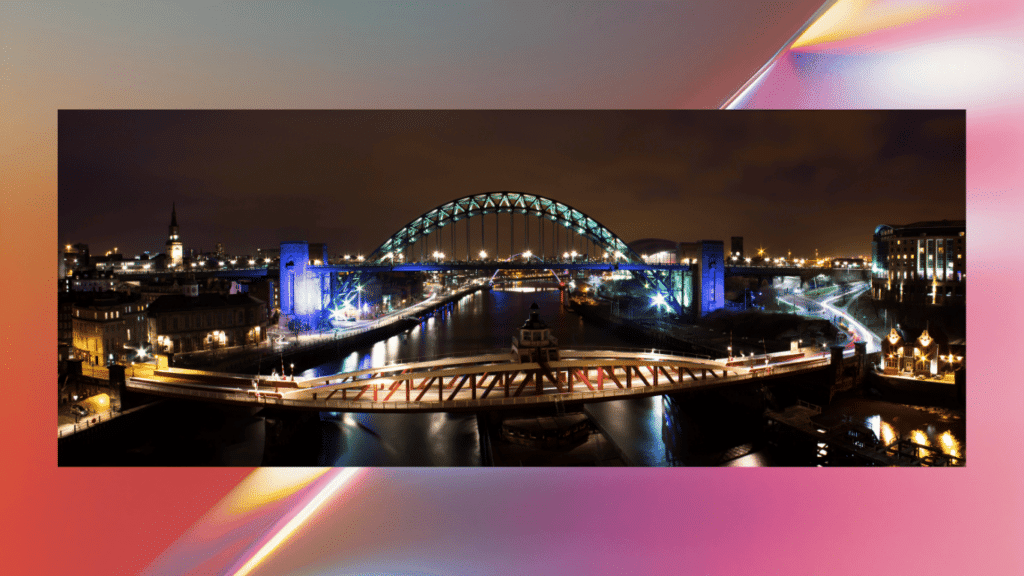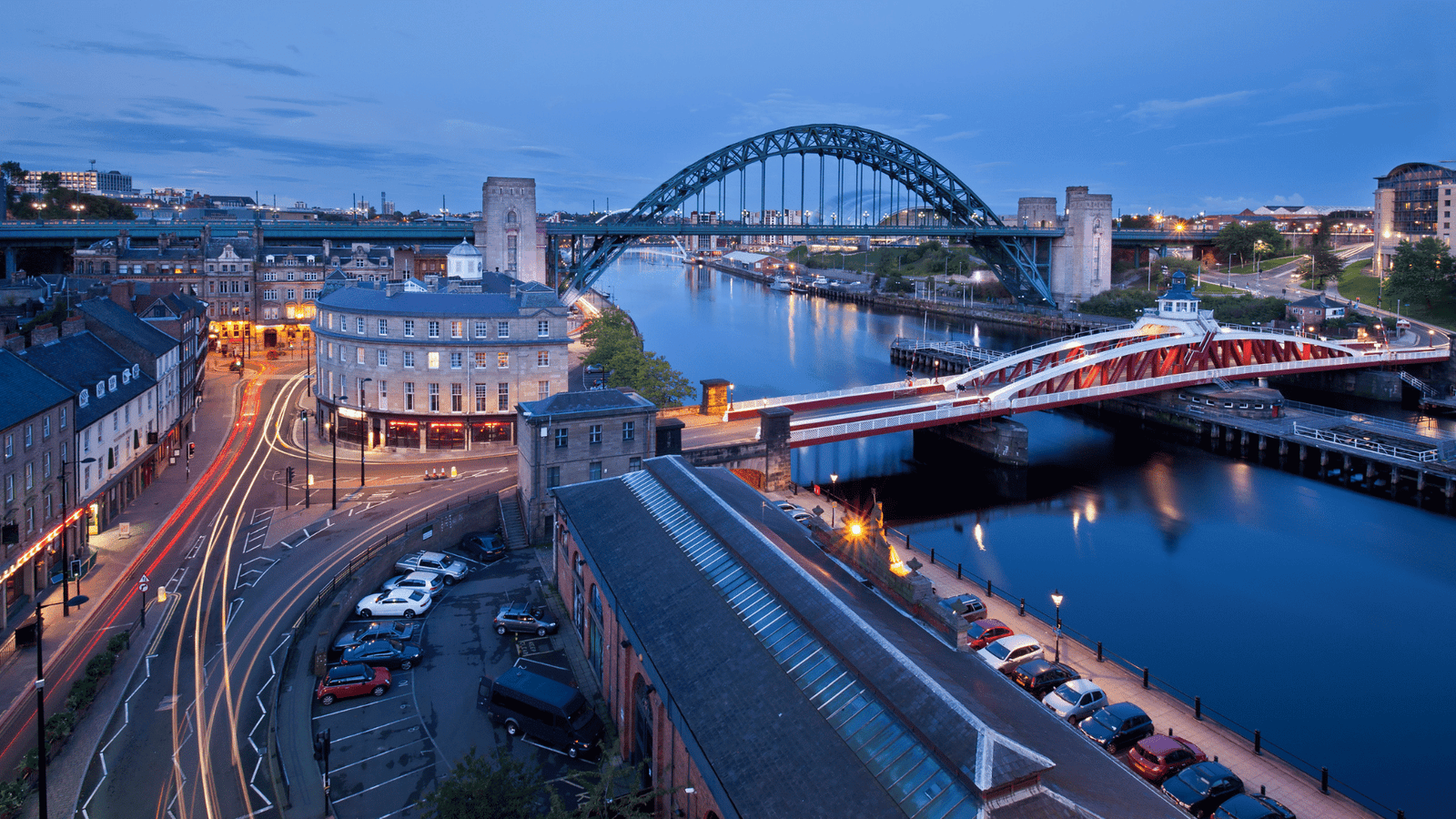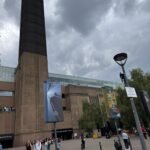Newcastle upon Tyne is a vibrant city in northeast England. It sits on the north bank of the River Tyne and has a rich history dating back to Roman times. The city is known for its friendly locals, called Geordies, and their unique accent.
You’ll find plenty to see and do in Newcastle. The city boasts impressive architecture, from the medieval Castle Keep to the modern Sage Gateshead concert hall. Newcastle is also famous for its seven bridges spanning the River Tyne, including the iconic Tyne Bridge.
Newcastle has a lively cultural scene. You can explore world-class museums like the Great North Museum or enjoy performances at the Theatre Royal. The city is also home to two universities, giving it a youthful energy. With its mix of history, culture, and nightlife, Newcastle offers something for everyone.
History
Newcastle upon Tyne’s story spans nearly 2,000 years. You’ll discover how it grew from a Roman fort to a major industrial center and modern city.
Roman Era
The Romans built a fort called Pons Aelius here in 122 AD. It guarded a bridge over the River Tyne. The fort was part of Hadrian’s Wall, a massive defense structure.
Remains of the Roman fort still exist under the castle. Archaeologists have found pottery, coins, and other artifacts from this time. The Roman occupation lasted until around 410 AD.
Middle Ages
After the Romans left, Newcastle became part of the Anglo-Saxon kingdom of Northumbria. In 1080, the Normans built a wooden castle here. This “new castle” gave the town its name.
The town grew as a regional center for trade. It became known for wool exports. In 1400, Newcastle got its first mayor. The town walls, built in the 13th and 14th centuries, protected it from Scottish attacks.
Industrial Revolution
Newcastle boomed during the Industrial Revolution. Coal mining became a major industry. The city exported coal to London and other places.
Shipbuilding also grew important. Many technological advances happened here. George Stephenson built his first locomotive in Newcastle in 1814.
The city’s population exploded. New neighborhoods sprang up to house workers. Factory smoke and coal dust filled the air.
20th Century to Present

Newcastle faced challenges in the 20th century. Both World Wars brought damage from German bombing. After 1945, traditional industries declined. Shipyards closed and coal mines shut down.
The city has reinvented itself since then. You’ll find new industries like software and green energy. The quayside area has been redeveloped with museums and restaurants.
Newcastle University and Northumbria University bring students to the city. Sports, especially football, play a big role in local culture. The city continues to evolve while honoring its long history.
Geography and Climate
Newcastle upon Tyne sits on the north bank of the River Tyne in northeast England. The city’s unique landscape and maritime climate shape its character.
Topography
Newcastle’s terrain varies from the riverside to hilly areas. The city center lies on a plateau above the Tyne, with steep streets leading down to the river. To the north, you’ll find higher ground with panoramic views.
The iconic Tyne Bridge spans the river gorge, connecting Newcastle to Gateshead. Seven bridges in total cross this section of the Tyne, forming a distinctive skyline.
Green spaces dot the urban landscape. The Town Moor, a large grassland, covers about 1,000 acres north of the city center.
Weather Patterns
Newcastle has a temperate maritime climate. Summers are mild, with average highs around 20°C (68°F) in July and August. Winters are cool but not severe, with January lows typically around 3°C (37°F).
Rainfall is moderate throughout the year. You can expect about 650mm (26 inches) annually. October and November tend to be the wettest months.
The city’s coastal location brings brisk winds, especially in winter. These winds can make it feel colder than the actual temperature.
Snow is not common, but you might see a few light snowfalls each winter. Spring and autumn bring changeable weather, with a mix of sunny and rainy days.
Economy
Newcastle upon Tyne has a diverse and growing economy. The city has shifted from its industrial roots to become a hub for various sectors.
Primary Industries
Mining and shipbuilding once drove Newcastle’s economy. Coal mining played a big role in the city’s growth. The River Tyne was home to many shipyards. These industries have declined, but their legacy remains.
Today, new industries have taken their place. Renewable energy is a growing sector. The city is investing in offshore wind farms. This creates jobs and helps the environment.
Employment Sectors
You’ll find many job opportunities in Newcastle. The service sector is now the largest employer. This includes retail, hospitality, and tourism.
The city is also known for its strong public sector. The NHS and local government provide many jobs. Education is another big employer, with two universities in the city.
Tech companies are on the rise in Newcastle. The city has a growing digital sector. This attracts young professionals and startups.
Economic Development
Newcastle is working hard to boost its economy. The city has many plans to attract businesses and create jobs.
You’ll see new developments popping up. The Quayside area has been transformed. It now hosts offices, restaurants, and cultural venues.
The city is also focusing on innovation. Science Central is a new hub for research and technology. It aims to bring together businesses and academics.
Newcastle is improving its transport links too. This makes it easier for people to work and do business in the city.
Demographics and Culture
Newcastle upon Tyne has a diverse population with a rich cultural heritage. The city offers many entertainment options and a thriving arts scene for residents and visitors alike.
Population Statistics
Newcastle’s population stands at around 300,000 people. The city has seen steady growth in recent years. Young adults make up a large portion of residents, with many students attending local universities.
The ethnic makeup is mostly White British, but there are growing communities of Asian, Black, and mixed-race residents. This diversity adds to Newcastle’s vibrant cultural mix.
Immigration has brought new flavors and traditions to the city. You’ll find Polish, Chinese, and South Asian communities adding to Newcastle’s multicultural feel.
Cultural Heritage
Newcastle’s history as a major industrial center shapes its cultural identity. The city’s working-class roots are still evident in its friendly, down-to-earth atmosphere.
Geordie culture is a key part of Newcastle’s charm. The local dialect and accent are points of pride for many residents. You’ll hear unique Geordie phrases and slang throughout the city.
Newcastle’s maritime past is celebrated in its museums and architecture. The iconic Tyne Bridge stands as a symbol of the city’s engineering prowess.
Local traditions like the Great North Run showcase Newcastle’s community spirit. These events bring people together and highlight the city’s welcoming nature.
Entertainment and Arts
Newcastle boasts a lively music scene. You can enjoy live performances at venues like the O2 Academy and Sage Gateshead. Local pubs and clubs offer a range of music styles any night of the week.
The city’s theaters present world-class productions. The Theatre Royal hosts touring West End shows, while smaller venues showcase local talent.
Art lovers will appreciate Newcastle’s galleries. The BALTIC Centre for Contemporary Art features cutting-edge exhibitions. The Laing Art Gallery houses an impressive collection of paintings and sculptures.
Newcastle’s nightlife is legendary. The Bigg Market and Quayside areas are popular spots for a night out. You’ll find a mix of trendy bars, traditional pubs, and dance clubs to suit all tastes.
Government and Politics
Newcastle upon Tyne has a local government system that manages city affairs. The city council provides services and makes decisions for residents. Political parties compete for control of the council through elections.
Local Governance
Newcastle City Council runs the city. It has 78 councillors elected every four years. The council is based at the Civic Centre in the city center.
The council handles many local services. These include:
- Waste collection
- Road maintenance
- Parks and recreation
- Social care
- Housing
The council also makes decisions on planning and development in Newcastle.
Political Structure
Labour has controlled Newcastle City Council for many years. Other parties like Liberal Democrats and Conservatives also have councillors.
The city elects Members of Parliament (MPs) to represent it in the UK Parliament. Newcastle has three parliamentary constituencies:
- Newcastle upon Tyne Central
- Newcastle upon Tyne East
- Newcastle upon Tyne North
Each constituency elects one MP. Elections happen at least every five years.
Civic Services
You can access many council services online or in person. The council runs libraries, leisure centers, and community spaces across Newcastle.
Key civic services include:
- Registering to vote
- Paying council tax
- Applying for housing
- Reporting issues like potholes or fly-tipping
- Getting parking permits
The council also provides support for vulnerable residents. This includes social care for elderly and disabled people.
Newcastle has a City of Sanctuary status. This means it welcomes refugees and asylum seekers.
Education
Newcastle upon Tyne offers a range of educational options from primary schools to universities. The city has a strong focus on learning and research across different levels.
Primary and Secondary Schools
Newcastle has many primary and secondary schools for children aged 4-18. The city council oversees most state schools. Some popular options include Gosforth Academy and St Cuthbert’s High School.
There are also independent schools like Newcastle School for Boys and Newcastle High School for Girls. These charge fees but often have smaller class sizes.
Many schools in Newcastle perform well in national rankings. The city aims to provide quality education for all students.
Higher Education
Newcastle University is the city’s main higher education institution. It’s known for its research and teaching quality. The university offers a wide range of courses across many subjects.
Northumbria University is another major university in Newcastle. It focuses on vocational and professional programs. Many students choose it for subjects like business and law.
Both universities attract students from around the UK and the world. They contribute to Newcastle’s vibrant student culture.
Research Institutions
Newcastle is home to several important research centers. The Centre for Life is a science village in the city center. It does research on genetics and stem cells.
The Newcastle University Institute for Ageing studies ways to improve life for older people. Their work helps make Newcastle an age-friendly city.
The National Innovation Centre for Data is based at Newcastle University. It works with businesses to use data in new ways.
These institutions make Newcastle a hub for scientific research and innovation.
Transportation
Newcastle upon Tyne has a well-developed transportation network. You’ll find various options for getting around the city and connecting to other areas.
Public Transport Systems
Newcastle’s Metro system is a key part of public transit. It covers 60 stations across the city and nearby areas. You can use it to reach popular spots like St James’ Park and the airport.
Buses are another common way to travel. Go North East and Stagecoach run frequent services. They connect Newcastle to surrounding towns and villages.
For longer trips, you can use the train. Newcastle Central Station offers connections to major UK cities. London is about 3 hours away by rail.
Major Roads and Highways
The A1 motorway is Newcastle’s main road link. It connects the city to London in the south and Edinburgh in the north. The A19 is another important route. It runs north-south along the coast.
Within the city, you’ll find several key roads:
- The Central Motorway (A167(M))
- The Coast Road (A1058)
- The Tyne Bridge, linking Newcastle to Gateshead
These roads can get busy during rush hour. Plan your trips to avoid peak times if you can.
Connectivity
Newcastle International Airport serves the city. You can fly to many UK and European destinations from here. It’s about 6 miles from the city center.
The Port of Tyne is vital for sea transport. It handles cargo ships and cruise liners. You can take a ferry to Amsterdam from the nearby North Shields terminal.
For cyclists, Newcastle has been improving its bike lanes. The National Cycle Network Route 1 passes through the city. It’s part of a longer route from Dover to the Shetland Islands.
Architecture and Landmarks
Newcastle upon Tyne boasts a mix of historic and modern architecture. You’ll find grand old buildings alongside sleek new structures. The city also offers lovely green spaces for relaxation.
Historic Buildings
Newcastle Castle stands as a symbol of the city’s medieval past. Built in the 12th century, its stone walls have watched over Newcastle for centuries. You can explore the keep and learn about its history.
The Grainger Town area showcases beautiful Georgian architecture. Grey Street, with its curved design, is often called one of the finest streets in England. You’ll see elegant facades and intricate details on many buildings here.
St. Nicholas Cathedral is another must-see. This 14th-century church has a distinctive lantern tower. Inside, you’ll find stunning stained glass windows and ornate stonework.
Modern Structures
The Sage Gateshead shines on the south bank of the River Tyne. Its curved glass and steel design makes it look like a giant bubble. It’s a world-class music venue and a symbol of Newcastle’s cultural revival.
The Millennium Bridge is a unique tilting bridge. It opens like an eyelid to let ships pass. At night, it lights up in different colors, creating a beautiful reflection on the water.
Gateshead’s BALTIC Centre for Contemporary Art occupies a converted flour mill. Its industrial exterior hides modern galleries inside. You can enjoy art exhibits and great views of the city from its viewing platform.
Parks and Public Spaces
Jesmond Dene offers a peaceful escape from city life. This wooded valley has walking trails, a pet’s corner, and a waterfall. It’s perfect for a relaxing stroll or a family picnic.
Exhibition Park hosts events and has sports facilities. You’ll find tennis courts, a skate park, and a boating lake here. The park is also home to the Great North Museum: Hancock.
Leazes Park is Newcastle’s oldest park. It has a lake, formal gardens, and open green spaces. You can feed the ducks, play sports, or simply relax on the grass.
Sports and Recreation
Newcastle upon Tyne offers a variety of sports and recreational activities for residents and visitors alike. The city boasts professional football clubs, modern facilities, and outdoor spaces for leisure pursuits.
Football Clubs
Newcastle United F.C. is the city’s premier football club. They play at St. James’ Park, a 52,000-seat stadium in the heart of Newcastle. The team competes in the Premier League and has a passionate fan base known as the Toon Army.
Gateshead F.C. is another local club. They play at the Gateshead International Stadium and compete in the National League North.
Recreational Facilities
You’ll find many modern sports centers in Newcastle. The John Carver Fitness Suite offers gym equipment and fitness classes. The City Pool and Turkish Baths provide swimming and relaxation options.
The Walker Activity Dome has indoor football pitches and a climbing wall. For ice skating, you can visit Whitley Bay Ice Rink just outside the city.
Outdoor Activities
Newcastle’s parks and green spaces are perfect for outdoor recreation. Jesmond Dene is a popular spot for walking and jogging. The Town Moor offers vast open areas for picnics and kite flying.
You can cycle along the Hadrian’s Cycleway, which follows the ancient Roman wall. Water sports enthusiasts can try kayaking or paddleboarding on the River Tyne.
The nearby coast provides opportunities for surfing and beach activities at Tynemouth and Whitley Bay.
Healthcare
Newcastle upon Tyne offers a range of healthcare services and initiatives to keep residents healthy. The city has several hospitals and clinics, as well as programs to promote public health.
Hospitals and Clinics
Newcastle has top-notch medical facilities to serve its population. The Royal Victoria Infirmary (RVI) is the city’s largest hospital. It provides emergency care and many specialist services.
The Freeman Hospital is known for its heart and lung treatments. It’s one of the UK’s main centers for organ transplants.
You’ll find the Great North Children’s Hospital at the RVI. It cares for kids from across the region.
For mental health needs, there’s St. Nicholas Hospital. It offers both inpatient and outpatient services.
Many GP clinics are spread throughout Newcastle. These handle routine care and refer patients to hospitals when needed.
Public Health Initiatives
Newcastle City Council runs programs to improve residents’ health. The council focuses on stopping smoking, fighting obesity, and promoting exercise.
You can join free fitness classes in local parks. These help you stay active and meet others in your community.
The city has set up walking and cycling routes. These make it easier for you to choose active transport.
Newcastle offers health checks to catch issues early. You can get these at GP offices or community centers.
There are also campaigns to raise awareness about mental health. These aim to reduce stigma and help people seek support when needed.
Media and Communications
Newcastle upon Tyne has a vibrant media scene with local TV, radio, newspapers, and digital platforms. The city offers diverse options for staying informed and entertained.
Broadcasting Services
You can tune into BBC Newcastle for local radio programming. The station covers news, sports, and music for the Tyne and Wear area. Metro Radio and Heart North East also broadcast from Newcastle, playing popular music and hosting talk shows.
For TV, BBC North East and Cumbria provides regional news coverage. ITV Tyne Tees is another option for local television content. These stations keep you updated on events happening in and around Newcastle.
Print and Digital Media
The Chronicle is Newcastle’s main local newspaper. It brings you daily news about the city and surrounding areas. You can pick up a print copy or read articles online.
Digital media options are growing in Newcastle. The Newcastle Journal offers online news coverage. ChronicleLive is a popular website for local stories and updates.
Social media platforms like Facebook and Twitter are also important for staying connected. Many local businesses and organizations use these to share news and engage with the community.
Frequently Asked Questions
Newcastle upon Tyne is a vibrant city with lots to offer visitors and residents alike. Here are answers to some common questions about this popular destination in northeast England.
What are the top attractions to visit in Newcastle upon Tyne?
You’ll find plenty to see and do in Newcastle. Top attractions include the iconic Tyne Bridge, the bustling Quayside area, and the impressive Castle Keep.
The Angel of the North statue just outside the city is also a must-see landmark. For art lovers, the BALTIC Centre for Contemporary Art offers world-class exhibitions.
Can you list some popular restaurants in Newcastle upon Tyne?
Newcastle has a thriving food scene with options for all tastes and budgets. Some popular choices include House of Tides for fine dining and The Broad Chare for traditional pub food.
For Italian cuisine, try Sabatini’s. Blackfriars Restaurant, set in a 13th-century friary, offers a unique dining experience with locally-sourced ingredients.
What is the population of Newcastle upon Tyne?
As of 2021, the population of Newcastle upon Tyne is about 300,000 people. This makes it the most populous city in the North East region of England.
The wider urban area, which includes nearby towns, has a population of around 1.6 million.
In which country is Newcastle upon Tyne located?
Newcastle upon Tyne is located in England, which is part of the United Kingdom. It sits in the northeast of England, about 275 miles north of London.
The city is close to the border with Scotland, roughly 100 miles south of Edinburgh.
Why is Newcastle upon Tyne famous?
Newcastle is famous for many reasons. It’s known for its industrial heritage, particularly shipbuilding and coal mining. The city is also famous for its passionate football culture and Newcastle United FC.
Newcastle’s nightlife is legendary, with a wide range of bars and clubs. The friendly locals, known as Geordies, are also a big part of the city’s fame.
Is the cost of living in Newcastle upon Tyne considered high?
Compared to many UK cities, especially London, Newcastle upon Tyne has a relatively low cost of living. Housing costs are generally more affordable than in southern England.
Food, transportation, and entertainment are also reasonably priced. This makes Newcastle an attractive option for students and young professionals.





